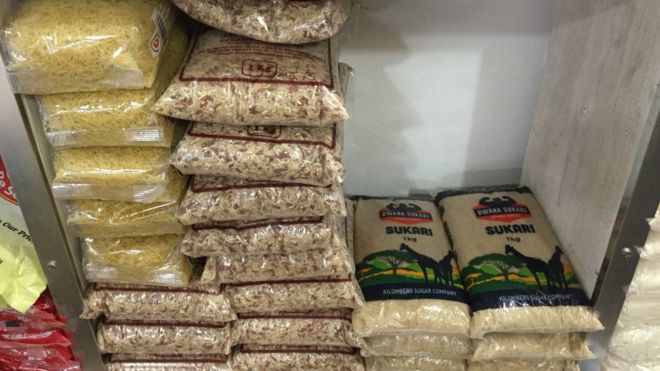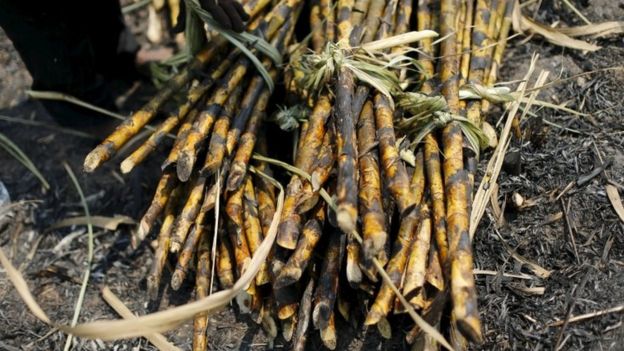 There is plenty of rice and pasta but sugar supplies have been running low and getting more expensive
There is plenty of rice and pasta but sugar supplies have been running low and getting more expensiveYou know there is trouble when you walk into East Africa's biggest supermarket and on the shelves where usually there is sugar, there are now eggs.
Over the past month or so, Tanzania has been grappling with a shortage of sugar. Government and business accuse each other of creating the crisis, but many here believe it started with the decision of President John Magufuli in February to require sugar importers to obtain permits from State House.
The president said the importation process was marked by corruption, the market flooded with poor quality or adulterated products and that the country had failed to protect local factories while importers grew rich.
"You find an officer issuing permits for sugar imports when local producers have enough sweetener for the market in that period," he said.
"Some of the imported sugar is of inferior quality compared to our locally produced sugar and some poses health risks to consumers. I thus direct that no permit be issued without my approval."
The intervention caused prices to double almost immediately. Now, in many market places, sugar is sold at $1.05 a kilo, while in some places it goes for up to $2, three times the government's fixed price.
Hoarding?
Tanzania's annual domestic sugar consumption is about 420,000 tonnes while local production is 320,000 tonnes. This leaves a deficit of about 100,000 tonnes a year to be made up by imports.
Local producers have been complaining that rising imports have caused them cashflow problems while also threatening the livelihoods of 10,000 sugar cane growers.
The government is now accusing traders and distributors of hoarding, saying they have been creating an artificial shortage to justify price hikes. The business community rejects this.
 REUTERSThe livelihoods of 10,000 Tanzanian sugar cane growers are in question
REUTERSThe livelihoods of 10,000 Tanzanian sugar cane growers are in questionEconomist Prof Honest Ngowi says more research is needed before blame can be apportioned to producers or distributors.
But, he says: "The domestic factories are not able to produce the needed quantity. There is a need to interrogate why the domestic factories are not able to bridge the 100,000 tones deficit."
In the meantime, the government says it will import 70,000 tonnes of sugar to fill the shortfall.
Economists agree this is necessary but warn it comes with a hefty price tag.
"Imports are costly to the economy," says Mr Ngowi.
It means parting not only with scarce foreign currency. "It also implies exporting jobs, incomes and government revenues."
And that makes those shelves full of eggs a matter of national economic importance.
"The art of living consists of knowing what to pay attention to and what to ignore." -- Mardy Grothe